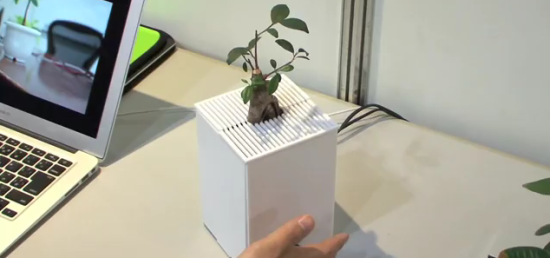Japanese Researchers Developing Interactive Plants That Will Wave At You
We live in a particularly interactive age. Sometimes it seems like you’re hard-pressed to find a thing that isn’t interactive in one respect or another without locking yourself in a closet and sitting among the shoes in the fetal position. If researchers at Keio University in Japan have their way, yet another thing will be pulled into the wide world of interactivity: Plants. Interactive plants, which seem to serve little purpose beyond being interactive, are designed to react to and convey emotions. How? Basically, by turning into puppets.
The plants are attached to motors underneath their pots by a series of threads wrapped around a selection of their leaves and branches. These motors are in turn connected to a microphone and a motion sensor. Then, when the motion detector notices you tripping over the pot, or the microphone picks you up mumbling under your breath about “that stupid potted tree,” it triggers the motors and whips the plant into a frenzy of enthusiastic puppetry as if to say “I heard that, jerk!”
The plants are able to express a series of emotions, or at least, emulate them. The motors and sensors are designed to move the plant’s branches in different ways to simulate different emotions. These choreographed emotional dances were developed by humans who played with actuators and decided that this kind of shake looks like laughing while another looks like seething rage. It’s a matter of opinion as to whether or not they were particularly successful.
Over the course of a year of development, the researches have found no evidence that these calisthenics harm the plants in any way, despite fears that they might. That being the case, they want to scale this technology for all kinds of plants, large and small, so that plants may “[move] freely in places where people go about their lives.” Get ready for emotional trees, folks. And brace yourselves because who knows what’s next. Maybe emotional mosses, or algae.
(via Ubergizmo)
- Japanese clockwork robots
- These Japanese robo-legs don’t need a power source
- Life-sized Gundam in Japan
Have a tip we should know? tips@themarysue.com
